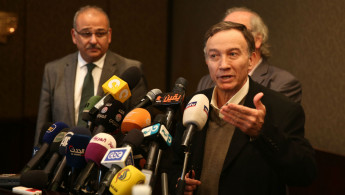Syrian opposition in Cairo focuses on unity and transition
The Moscow conference, scheduled to start on Monday, is being boycotted by much of the opposition, and, according to Reuters, none of the main Sunni groups fighting the regime inside Syria have been invited.
Hisham Marwah, the Syrian National Coalition's (SNC) vice-president, who attended the meeting in a personal capacity, told al-Araby al-Jadeed: "All opposition groups agreed on a common formula during the meeting, the outcomes of which should be studied in detail, without prejudgment or misinterpretation."
| The fact the coalition was not invited... does not mean the coalition does not welcome constructive decisions. - Hisham Marwah, SNC |
The Cairo meeting was hosted by the Egyptian Council for Foreign Affairs, which invited dozens of leading Syrian figures to attend.
Most invitees were from the National Coordination Committee (NCC), regarded as the internal opposition within Syria. The NCC was represented by its head abroad, Haitham Manna.
The Building the Syrian State movement (BSS) was also present. The council also extended individual invitations to members of the SNC, including Fayez Sara, Salah Darwish and Qassem al-Khatib, as well as the former head of the coalition, Ahmed al-Jarba, who all attended the meeting.
Saleh Musallam, head of Syria's Kurdish Democratic Union party, Syrian actor Jamal Suleiman and other opposition members were also among the attendees.
A source who attended the meeting told al-Araby al-Jadeed that there was a great deal of tension and debate, especially between the BSS delegation and some attendees, on the structure of transitional governance.
The BSS reportedly suggested the creation of a national authority representing both the regime, the opposition and other parties to lead the transitional phase - but the BSS delegation did not vote on the final resolution.
Another controversial issue was the suggestion by one of the participants to send a cable of condolence to the Kingdom of Saudi Arabia. The attendees agreed to consider the idea.
Marwah, the SNC vice-president, said he welcomed all efforts to unite the opposition.
"The fact the coalition was not invited to the Cairo meeting does not mean the coalition does not welcome constructive decisions to reach a political solution based on the Geneva statement, or common positions it shares with other Syrian opposition groups."
However, other SNC members also attending in a private capacity, said they feared the next meeting would aim to create a new political entity, further dividing the opposition.
Democratic transition
| The participants set as a goal the transition to a democratic regime and sovereign civil state. |
In the conference's concluding statement, delegates agreed that the Syrian state with all its institutions should be maintained through the implementation of the Geneva statement, and especially the article in that agreement on forming a joint transitional governing body with full powers.
The governing body's task would be to supervise the process of democratic transition within a specific period and with international safeguards.
The participants set as a goal the transition to a democratic regime and sovereign civil state.
They also agreed that all forms of non-Syrian military presence in Syria must be ended, and no party other than the state should hold weapons - and that the military should be restructured and armed factions who accepted the political solution integrated into it.
They stressed that a political solution that guaranteed democratic change was the objective condition for mobilising Syrians against armed groups.
The attendees agreed to form a follow-up committee to prepare and promote the outcomes of the Cairo meeting on the Arab and international levels. Another meeting is scheduled to be held in the spring.
This is an edited translation from our Arabic edition.



